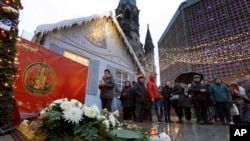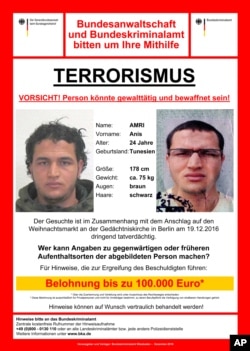The event’s organizers made the decision to reopen the market without party music or bright lights, which have been replaced by candles and flowers left at the site of the attack as tribute for those that were killed.
Authorities are engaged in a manhunt across Europe in search of a 24 year-old Tunisian man whom German officials said should have been deported months ago.
Anis Amri, the top suspect in the attack, was a rejected asylum seeker who had been under police surveillance following a tip he might try to buy weapons for a possible attack, but that investigation was dropped in September.
German Interior Minister Thomas de Maiziere said during a Thursday news conference there is a "high probability" Amri is responsible for the attack.
"We can report today that we have new information that the suspect is with high probability really the perpetrator," he said.
Police found Amri’s identification documents and finger prints in the cab of the truck, German officials confirmed Thursday.
His asylum application was denied six months ago, but he was not sent back to Tunisia because of problems with his documents.
Those revelations have renewed questions in Germany about how the country vets the thousands of people who have entered the country looking for asylum. German Chancellor Angela Merkel said a day after the attack it would be hard to bear if an asylum seeker were responsible.
“This would be particularly sickening for the many, many Germans who work to help refugees every day and for the many people who really need our help and are making an effort to integrate in our country,” she said.
Amri’s family members said they were stunned to learn he was the main suspect in the attack, and his brother urged Amri to turn himself in.
“I ask that he turn himself into the police,” Abdelkader Amri told the Associated Press. “If it is proved that he is involved, we dissociate ourselves from it.”
Abdelkader said Anis left Tunisia in 2011 to go to Europe and he may have been radicalized in an Italian prison, where he served three years for setting a refugee shelter on fire.
After leaving jail, Amri arrived in Germany in July 2015, where he requested asylum. His asylum request was denied, but he could not be deported because he had no passport and Tunisia declined to accept him.
Since he couldn’t be deported, Amri was issued a stay of deportation paper, which is the document police found in the truck he used to murder 12 people.
Merkel said Thursday she was proud of the public reaction to the attack and how calmly most people took it.
"I am certain we will meet this test we are facing," she said.
An official with the State Department said two U.S. citizens were among the 48 people injured during the attack, but provided no further details about those people.
The Islamic State group said it inspired the attack through its call for people to strike members of a coalition that is fighting the group in Syria and Iraq.
Before Amri emerged as the main suspect, police had detained a Pakistani man on suspicion of involvement in the Christmas-market attack, but he was later cleared and released.
US reaction
U.S. President-elect Donald Trump stressed his pledge to stop radical terror groups.
"What's happening is disgraceful," said Trump, who deemed the violence "an attack on humanity, and it's got to be stopped."
He added Wednesday that the violent attacks in Europe this week "prove" that he is "right" about his plans when he assumes power next month to institute tough screening of Muslims attempting to enter the United States.
The White House offered condolences in a statement that condemned the attack.
The U.S. State Department had earlier called for caution in market places and other public sites across Europe. It also warned U.S. citizens on the continent to be on the alert for "self-radicalized" extremists, who it said could strike without warning.







